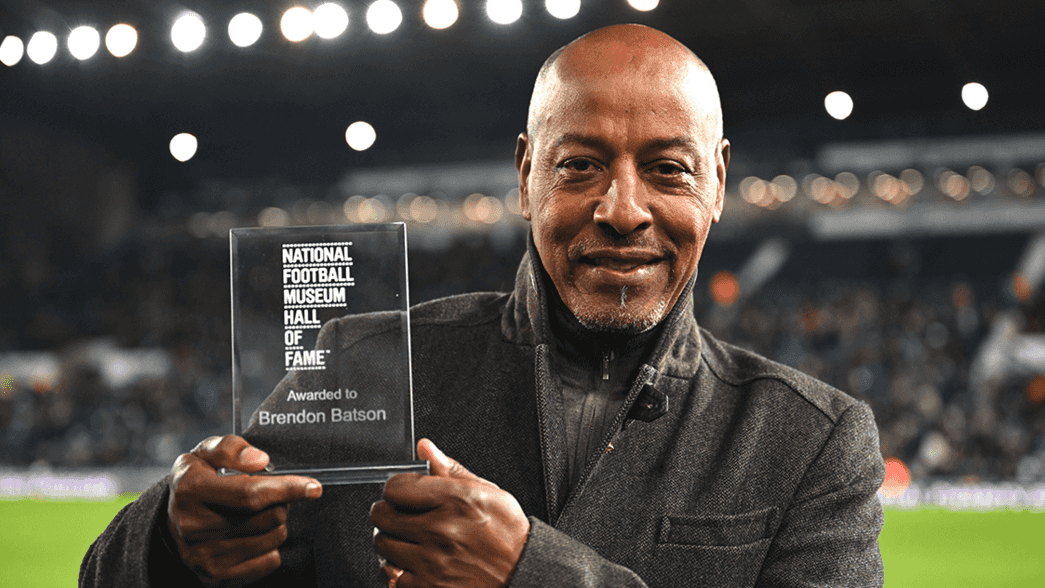Our former defender, Brendon Batson OBE, has been inducted into the National Football Museum Hall of Fame.
Born in Grenada, Batson and his family moved to the West Indies at the age of six, before migrating to England aged nine in 1962. Brendon started his professional career at Arsenal and became our first Black player when making his debut away at Newcastle United in March 1972.
The National Football Museum Hall of Fame aims to celebrate and highlight the achievements of those who have made an outstanding contribution to English football. The Hall of Fame also acknowledges and champions the careers of those that go beyond just impact on the pitch.
Brendon was inducted not only for his work on the pitch, but his trailblazing achievements, social impact, and service to football post-retirement.
He spent six years at the club before moving onto Cambridge United in January 1974. Batson starred in their 1976/77 Fourth Division title triumph and followed manager Ron Atkinson to settle at West Brom, where he was presented the award this evening ahead of their league fixture against Coventry City.
Speaking to us for Black History Month in October, Brendan shared his story.
"I got introduced to the sport by a school friend called Dennis Sheridan. I had a trial for the school team - and to be honest, it was a disaster! But I carried on, went back the following week and eventually got into the team.
From there, I seemed to progress very quickly. When we moved to Walthamstow, I was playing for Waltham Forest Boys and I got picked up as a 13-year-old by Arsenal. I was invited to train on a Monday and Thursday after school. And that’s how it started really.
When I arrived in England I’d never previously experienced racism but, within the first few days of me going to junior school, I was called a chocolate drop. I didn’t have a clue what it meant. Once I did, I would fight back - and that was something I did until I was about 14 or 15.
The real challenge for aspiring Black players back then was that there was no visibility. There were these negative connotations from clubs, from coaches, from scouts. People would say things like ‘Black players have no discipline, they’re lazy, have no heart and aren’t brave’. Those were the barriers you had to overcome back then.
I've said before that my time at Arsenal was really positive - the club was fantastic to me and it was a great place to grow up at in my formative years, where I was taking my first steps into the professional ranks.
When Arsenal did the double in 1971, I was in the youth team - we actually won the FA Youth Cup that same year. I was great friends with Terry Burton and Jim de Garis, our skipper at the time. The three of us formed a real friendship and I knew that they were there for me and that they would always support me.
Which brings me to my debut. In truth, it came as a bit of a shock and I didn’t really have enough time to think about it. It was a really miserable day up at Newcastle. I remember we got to half-time and Charlie George was pretty unwell. All of a sudden I was on the pitch. I remember there being some nervous excitement but it was only really afterwards when I tried to reflect on the performance and whether it was good enough that I realised I’d played for Arsenal. My name wasn’t even on the teamsheet as, back then, substitutes weren’t always listed.
Becoming Arsenal’s first Black player wasn’t something that I really gave much significance to at the time. In fact, I didn’t even know I was until I was introduced at an anti-racism event at Stamford Bridge many years later. When I found out, it was a bit of a surprise. Looking back on it, there’s a significance because there had to be a first."
After retirement, Brendon was appointed as the Deputy Chief Executive of the Player’s Football Association (PFA) in 1984. He spent almost two decades in that role and remains a PFA trustee to this day.
In 2023 Brendon released an autobiography, dubbed ‘The Third Degree’ in which he speaks candidly about his life in football, dealing with grief, and his life-long battles with racism.
Copyright 2024 The Arsenal Football Club Limited. Permission to use quotations from this article is granted subject to appropriate credit being given to www.arsenal.com as the source.










